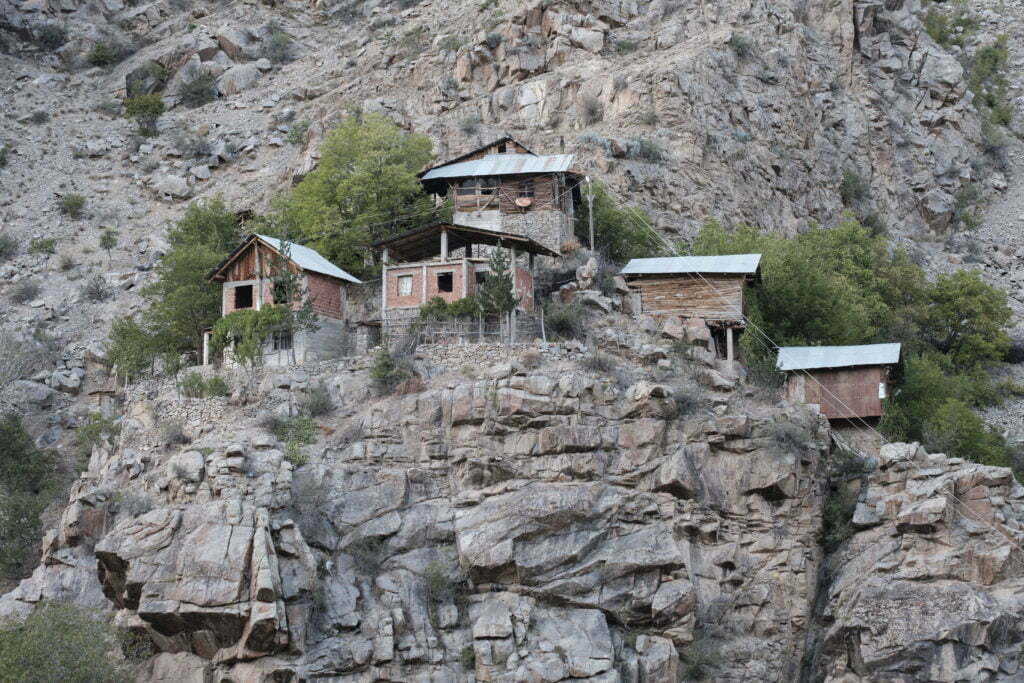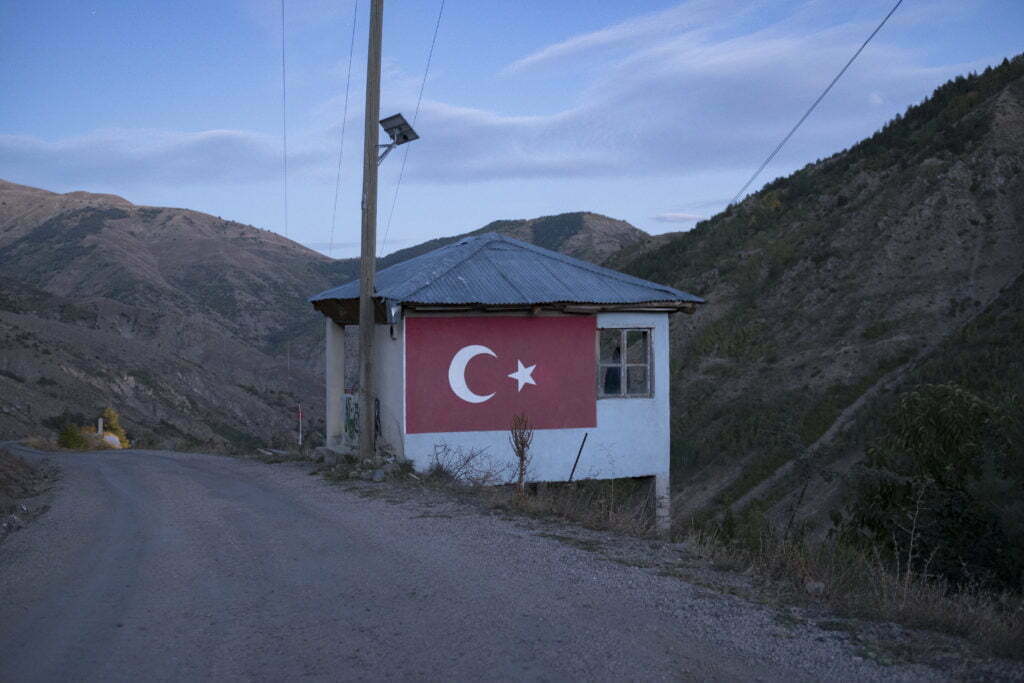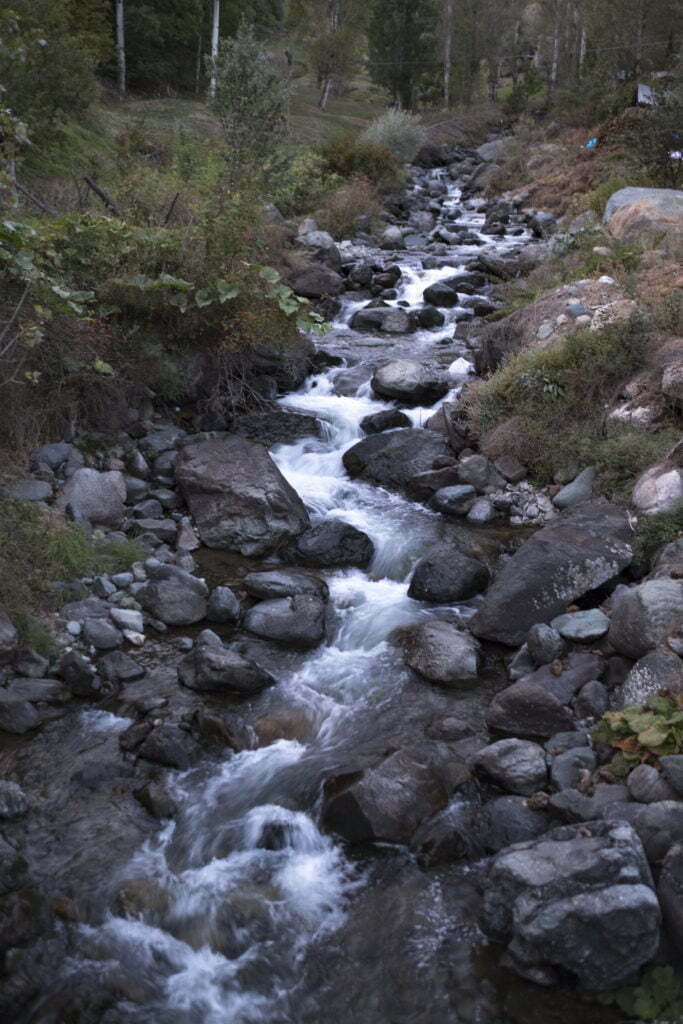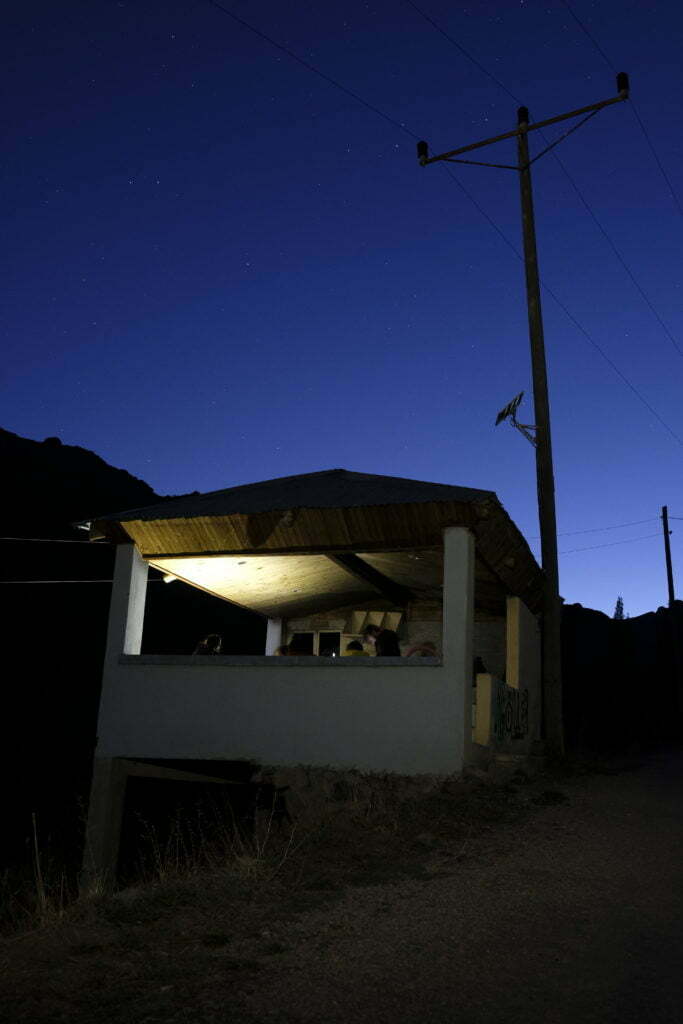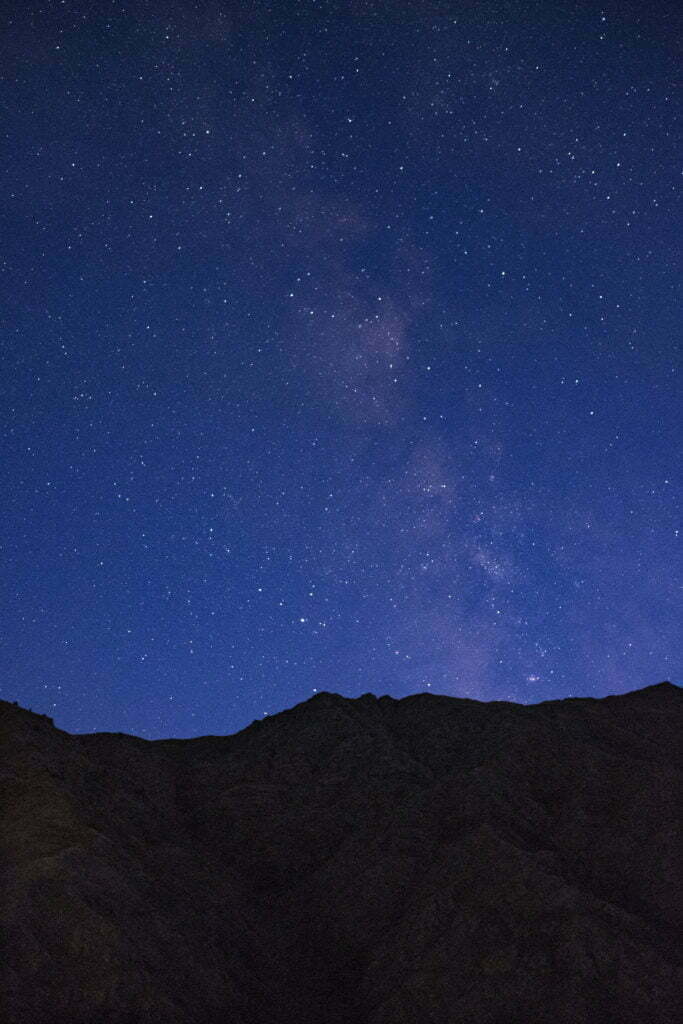DUYGU DAĞ
You must have seen the goats on your way here. To build the HEPPs, they blasted tunnels through the hills, which resulted in groundwater displacement. When no water was therefore left higher up, the goats have no choice but to come down in the morning and the evening for water.
We did, in fact, see mountain goats many times on the rocky slopes all along the Çoruh. The excitement at a possible encounter with wildlife peaked in the Aksu valley, where we traveled alongside signs that read “Beware of Bobcat.” Our aim in this enchanting valley formerly known as Salaçur, lying to the south of the Kaçkar mountains in Erzurum’s İspir district, was to meet the “Son of the Mountains.” Just as we were busy marveling at the houses perched improbably atop jagged rocks as if on the verge of toppling over, a hydroelectric power plant (HEPP) appeared out of nowhere. Mountain goats ambling right by the intake weir distract us, and we take a brief photo stop.
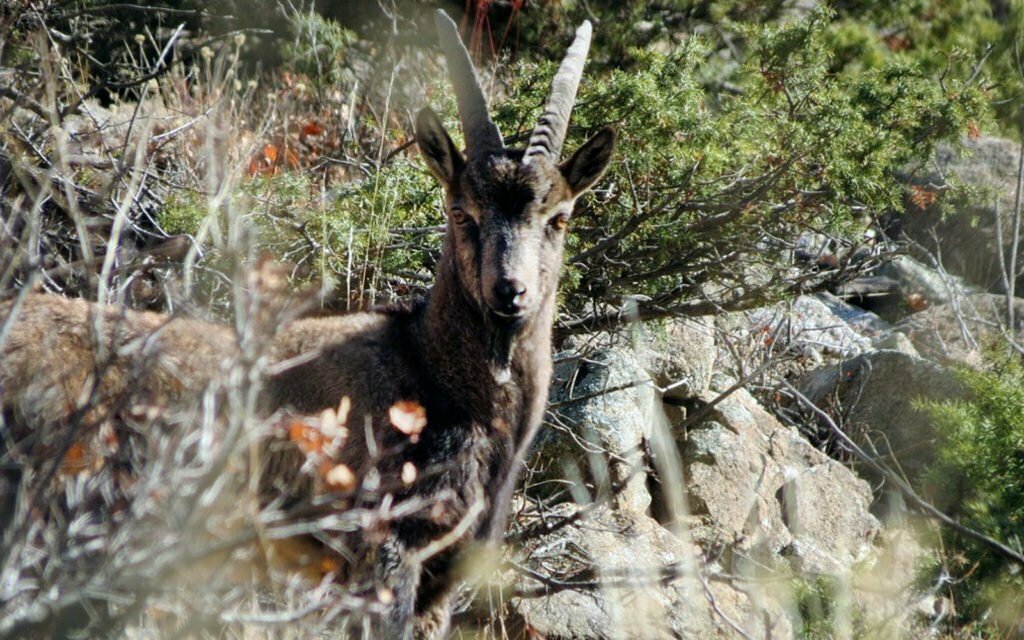
Bülent Erkan, who goes by Son of the Mountains, is a shepherd, mountaineer, and guide born and bred in this valley. In his third year in school, his father needed him to herd their sheep – an experience that ignited his growing love for nature. Erkan is not only a brilliant observer, but also knows every inch of the valley and the Kaçkar mountains like the back of his hand.
He learned about nature not from books, but by immersion – having rescued a poisoned eagle while wandering the mountains, witnessed the many hours-long struggles of a bear trying to protect its cub from a pack of wolves, and sat by glacial lakes to observe and take notes on red-spotted trout, each weighing 7 kg. From his experience he says, “Don’t look a wolf in the eye,” and “Don’t you call bears lumbering and clumsy, on the contrary, they are very agile animals.”
The Aksu Valley lies within the Erzurum İspir Verçenik Mountain Wildlife Reserve Area. Following the river upstream you reach the Yedigöller (Seven Lakes) National Park and then Verçenik, the second highest peak of the Kaçkars. The Son of the Mountains is apprehensive about the changes besetting the valley he was born and raised in.
They dumped the material excavated from the tunnels on the road and then in the riverbed. There used to be a waterfall by the Yedigöl HEPP, but they choked it with the rest of the construction waste and destroyed it. A court decision has upped the river’s environmental flow requirement by 4-5 times.
Environmental flows (or e-flows) describe the quantity of water that should be released from the diversion tunnels of hydropower plants back into a riverbed in order to maintain it. Of the two HEPPs operated by Borusan EnBW Energy on the Aksu river, the Yedigöl HEPP became active in 2011 and the Aksu HEPP in 2012. As the company fell drastically short of meeting the minimum environmental flow requirement prescribed in the Environmental Impact Assessment (EIA) report, agricultural fields in four of the village neighborhoods where villagers cultivated tomatoes, pepper, beans, mulberry, and corn went dry. The villagers then sued the company, which was subsequently forced to increase environmental flow.
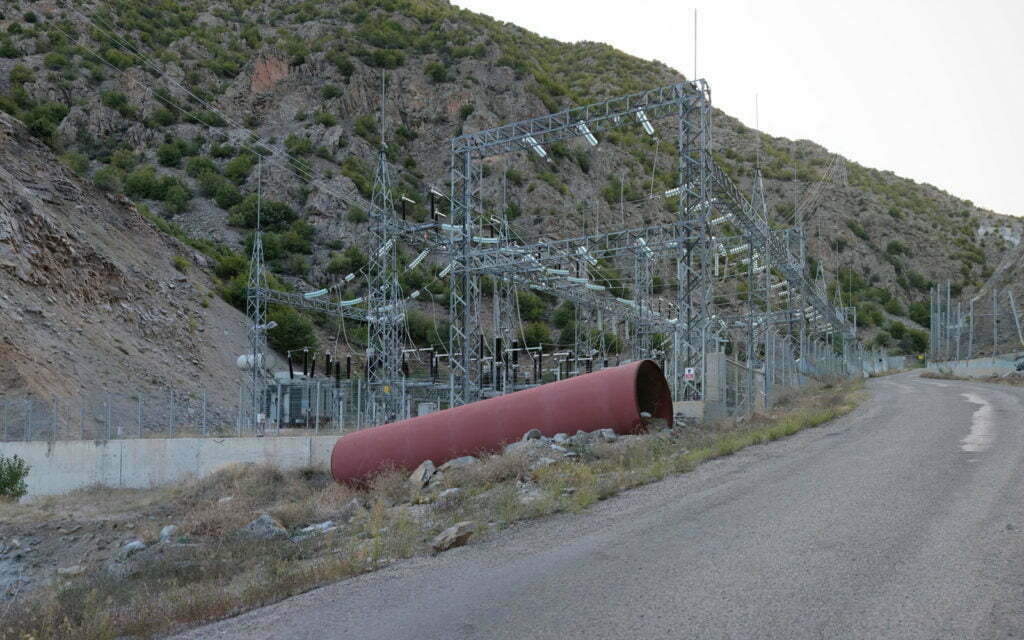
The Son of the Mountains tells us that not only crops and mountain goats, but all forms of life are impacted by the HEPP – that even the bears have difficulty finding drinking water. The environmental flow is not enough for the environment.
Red-spotted trout populated all of the streams in the Kaçkar region. Rising water temperatures due to HEPP activity caused alterations in the backbone structures of these fish.
As river levels fell, overall humidity levels in the region simultaneously rose due to dams built on the Çoruh, resulting in the proliferation of moles and new kinds of insects. The Son of the Mountains informs us that the Kaçkar glacier has begun melting, and the increase in air temperature is considerable. According to him, this region that has been thrown out of its natural balance by human intervention is, in fact, one of the most beautiful mountain ranges on the planet: “With its hundreds of lakes, it would rank in the world’s top ten after the Canadian lakes.”
We truly are in a place of stunning beauty. Below 2000 meters you find bobcats, mountain goats, and chukar partridge, above this altitude are wood grouse and grey partridge, and even higher up are Caspian snowcock and Alpine chamois. Meanwhile, in the Yedigöl (Seven Lakes) area (40.6633640/40.9801370) of this valley of such awe-inspiring floral and faunal diversity, the General Directorate of Mineral Research and Exploration (Maden Tetkik Arama – MTA) is carrying out drilling operations.
Having carefully monitored his homeland for many years, the Son of the Mountains continues to recount the impacts of infrastructure projects visible to the naked eye in this landscape that needs to be brought under wildlife conservation:
All along the Çoruh, in the Yusufeli direction, you will see that they have built a wire fence on the right side of the road. They put up a wire fence all along a slope, but there is a meter-wide gap between the slope and the fence. If an animal falls into that space, they have no way out. There is another fence just like this in Sırakonaklar; the road goes right through wildlife habitat.
I want to get to the top of the Everest too, so let’s have a road built.
The Son of the Mountains knows how to appreciate the landscape he lives in, if only others would too. If only we could all agree that this area should be preserved and kept untouched, in pristine condition. Instead we hear that two new HEPP projects are in the works between the Yedigöl-Biricik and Biricik-Köklüce neighborhoods in addition to the already existing ones in the Aksu valley.
Mines, HEPPs, dams, roads, bridges… The fact that there is not a single area that can remain protected, outside the reach of the destruction caused by these infrastructure projects promoted as indispensable for development, that even important natural sites such as national parks and wildlife reserves are all open to rezoning is disconcerting.
The land, water, and forests are the backbone of the planet. When you interfere with these and destroy them, this also spells the end of humankind.
